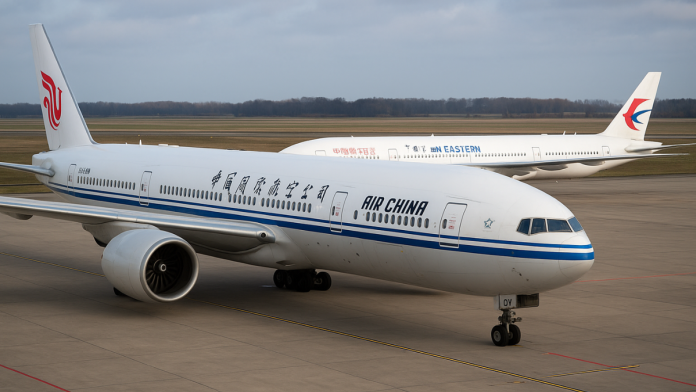China’s largest state-owned airlines are strongly opposing a new U.S. proposal that could ban them from flying over Russian airspace when traveling to or from the United States. The move comes after Russia closed its skies to most U.S. and European airlines in 2022, following sanctions due to the Ukraine conflict.
Air China, China Eastern, and China Southern are among six major Chinese airlines that have filed formal complaints with the U.S. Department of Transportation. These carriers argue that the proposed ban would create serious problems for passengers and increase travel costs. China Eastern explained that the ban would “harm the public interest” and cause major inconvenience for travellers from both China and the United States. According to the airline, longer flight routes would mean higher fuel consumption, longer travel times, and more expensive tickets.
Potential Impact on Travelers
China Southern added that thousands of travellers would be affected if the ban goes into effect. Air China estimated that at least 4,400 passengers could face disruptions during peak travel seasons, such as Thanksgiving and Christmas. China’s Foreign Ministry also criticized the U.S. proposal, calling it “punishing” for passengers worldwide.
Across party lines: Americans unite to arm Ukraine and tighten sanctions on Russia
Chinese companies said that flights over Russian airspace make journeys shorter and more efficient. They warn that a ban could force companies to take longer alternative routes, which would increase costs and flight times, ultimately burdening travellers on both sides.
Why U.S. Airlines Want the Ban
The U.S. Department of Transportation has said that allowing Chinese airlines to use Russian airspace gives them an unfair advantage over American carriers. U.S. airlines cannot fly over Russia, which makes their flights longer and more expensive. For some routes between China and the United States, flights are now two to three hours longer than they would be if U.S. carriers could cross Russian airspace.
The department explained that flying the shortest route is important because it saves time and fuel. This efficiency allows airlines to offer more attractive options to travellers. By being able to fly over Russia, Chinese airlines reduce their costs and can offer cheaper tickets, while U.S. airlines face higher expenses.
European companies have also raised complaints about this issue. United Airlines, for example, requested that Cathay Pacific, the Hong Kong-based airline, should also face the same restrictions as Chinese carriers. Many companies argue that access to Russian airspace directly affects competitiveness, pricing, and passenger satisfaction.
Impact on Travelers and Airlines
The dispute has immediate implications for passengers traveling between China and the United States. If the ban takes effect, flights could become longer, more expensive, and less convenient. The companies argue that longer flight paths not only increase fuel costs but also put pressure on schedules and profitability.
Chinese carriers have faced financial struggles in recent years, particularly since the COVID-19 pandemic. Despite this, they continue to operate popular routes between China and the U.S., which are historically profitable. Being able to fly over Russia has helped reduce operating costs, making services more competitive.
Passengers could face higher fares and longer travel times if the U.S. implements the ban. Airlines warn that busy travel seasons, such as Thanksgiving, Christmas, and summer holidays, would be particularly affected. Thousands of travellers may experience delays, inconvenience, and additional costs, according to estimates.
The U.S. Department of Transportation is now collecting public comments before making a final decision. This means the debate will continue, and the outcome could affect thousands of passengers traveling between the two countries.


